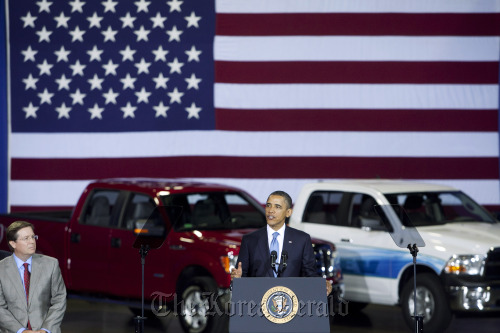Automakers agreed to double the fuel economy of the vehicles they sell in the U.S. to a fleetwide average of 54.5 miles per gallon by 2025, President Barack Obama said.
The White House negotiated the proposal, which will take effect in 2017, with automakers including General Motors Co., Ford Motor Co. and Toyota Motor Corp. The administration proposed a 56.2 mpg requirement last month, up from a fleetwide average of 27 mpg Friday for cars and light trucks.
“This agreement on fuel standards represents the single most important step we’ve ever taken to reduce our dependence on foreign oil,” Obama said Friday at an event in Washington with auto executives.
 |
U.S. President Barack Obama speaks during an event to announce improved fuel efficiency for cars and light-duty trucks in Washington, D.C., Friday. (Bloomberg) |
Obama is seeking to limit the amount of fuel used by U.S. vehicles as part of a pledge to reduce oil imports by a third by 2025. The agreement with automakers, which also curbs greenhouse-gas emissions, comes as his administration negotiates with Congress on raising the U.S. debt ceiling to avoid default.
Obama used the event to promote his energy priorities and to highlight some of the issues being weighed in the standoff over raising the federal debt ceiling.
The agreement on higher standards “is only possible because we made investments in technology,” Obama said. A “sensible and balanced approach” is needed to make sure the U.S. is able to sustain economic growth in the future, he said.
In the wrangling over the nation’s debt, Obama has argued that relying solely on cutting spending will sap research and education budgets. He also said the administration’s talks with automakers should serve as an example for Congress because they provided benefits for all parties.
“These standards are going to be a win for consumers, for these companies, for our economy, for our security and for our planet,” he said.
Ford, GM, Chrysler Group LLC, Bayerische Motoren Werke AG, Honda Motor Co., Hyundai Motor Co., Jaguar Land Rover, Kia Motors Corp., Mazda Motor Corp., Mitsubishi Motors Corp., Nissan Motor Co., Toyota and Volvo Cars, which represent 90 percent of vehicles sold in the U.S., agreed to support the proposal, according to a statement from the White House.
Some Japanese and European companies that manufacture mainly cars instead of trucks complained during the talks that the rule favors GM, Ford and Chrysler, because the fuel-economy standards for light trucks will increase more slowly than for cars, said people familiar with the talks.
Volkswagen AG didn’t sign the agreement to support the Obama administration’s proposal, the Wolfsburg, Germany-based carmaker said in an emailed statement. The “positive impact” of so-called clean diesel, used by the company’s mid-size Passat TDI, which can get 43 mpg on the highway and travel almost 800 miles on a tank of fuel, doesn’t receive consideration in the proposal, Volkswagen said.
“The proposal encourages manufacturers and customers to shift toward larger, less-efficient vehicles, defeating the goal of reduced greenhouse-gas emissions,” Tony Cervone, a Volkswagen spokesman, said in an emailed statement. “We are committed to the ongoing negotiations with the White House on reaching maximum achievable fuel economy and/or greenhouse-gas reduction standards.”
Daimler AG, the Stuttgart, Germany-based maker of Mercedes- Benz vehicles, also hasn’t agreed to support the proposal.
(Bloomberg)








